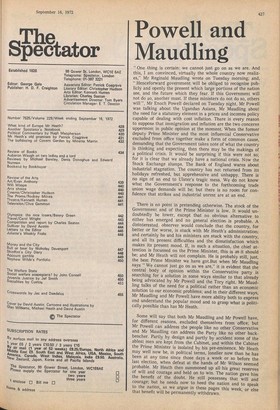Powell and Maudling
"One thing is certain: we cannot just go on as we are. And this, I am convinced, virtually the whole country now realizes," Mr Reginald Maudling wrote on Tuesday morning; and, "Henceforward government will be obliged to recognise publicly and openly the present which large portions of the nation see, and the future which they fear. If this Government will not do so, another must. If these ministers do not do so, others will ", Mr Enoch Powell declared on Tuesday night. Mr Powell was talking about the Ugandan Asians, Mr Maudling about the need for a statutory element in a prices and incomes policy capable of dealing with cost inflation. There is every reason to suppose that immigration and inflation are the two concerns uppermost in public opinion at the moment. When the former deputy Prime Minister and the most influential Conservative excluded from office together make a form of common cause, demanding that the Government takes note of what the country is thinking and expecting, then there may be the makings of a political crisis. It would be surprising if this were not so; for it is clear that we already have a national crisis. Now the Stock Exchange slumps. The Bank of England warns about industrial stagnation. The country has not returned from its holidays refreshed, but apprehensive and unhappy. There is no sign of an end to Ulster's tragic mess. We do not know what the Government's response to the forthcoming trade union wage demands will be; but there is no room for confidence that strikes and industrial unrest are at an end.
There is no point in pretending otherwise. The stock of the Government and of the Prime Minister is low. It would un doubtedly be lower, except that no obvious alternative to either has emerged and no general election is probable. A disinterested observer would conclude that the country, for better or for worse, is stuck with Mr Heath's administration; and certainly he and his ministers are stuck with the country, and all its present difficulties and the dissatisfaction which makes its present mood. If, in such a situation, the chief attention is focussed on the Prime Minister, this is as it should be; and Mr Heath will not complain. He is probably still, just, the best Prime Minister we have got.But when Mr Maudling says "We cannot just go on as we are," it is evident that the central body of opinion within the Conservative party is searching for a solution in some ways similar to that already being advocated by Mr Powell and the Tory right. Mr Maudling talks of the need for a political rather than an economic solution to our economic problems; and in their different ways, Mr Maudling and Mr Powell have more ability both to express and understand the popular mood and to grasp what is politi cally possible than has Mr Heath.
Some will say that both Mr Maudling and Mr Powell have, for different reasons, excluded themselves from office; but Mr Powell can address the people like no other Conservative and Mr Maudling can address the Party like no other backbencher. Partly by design and partly by accident some of the ablest men are kept from the Cabinet, and within the Cabinet the Prime Minister is isolated by his pre-eminence. Mr Heath may well now be, in political terms, lonelier now than he has been at any time since those days a week or so before the last election, when defeat at the hands of Mr Wilson seemed probable. Mr Heath then summoned up all his great reserves of will and courage and held on to win. The nation gave him the benefit of the doubt. He still possesses that will and courage; but he needs now to heed the nation and to speak to the nation, as we argue in these pages this week, or else that benefit will be permanently withdrawn.


































 Previous page
Previous page